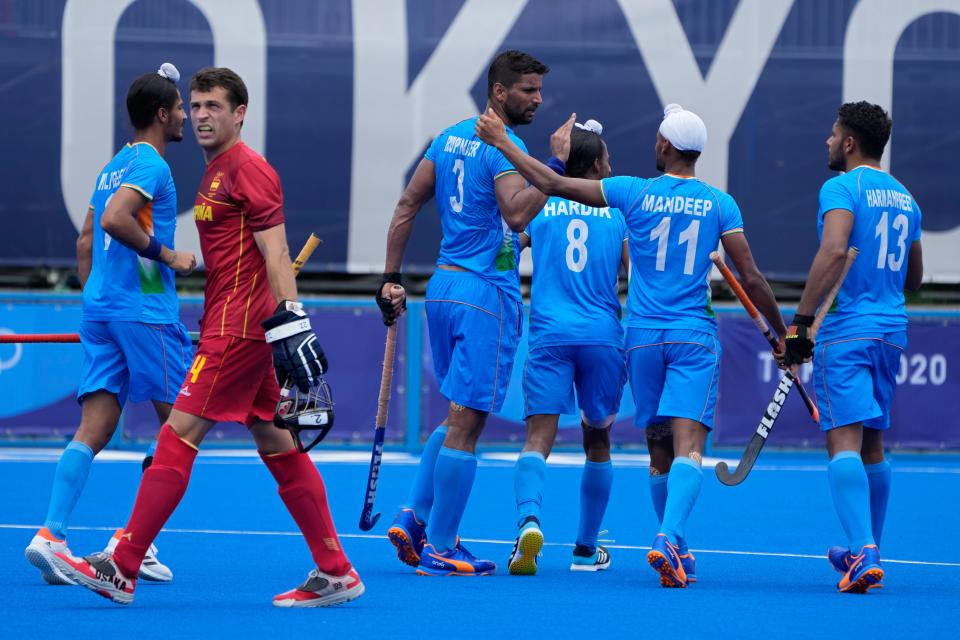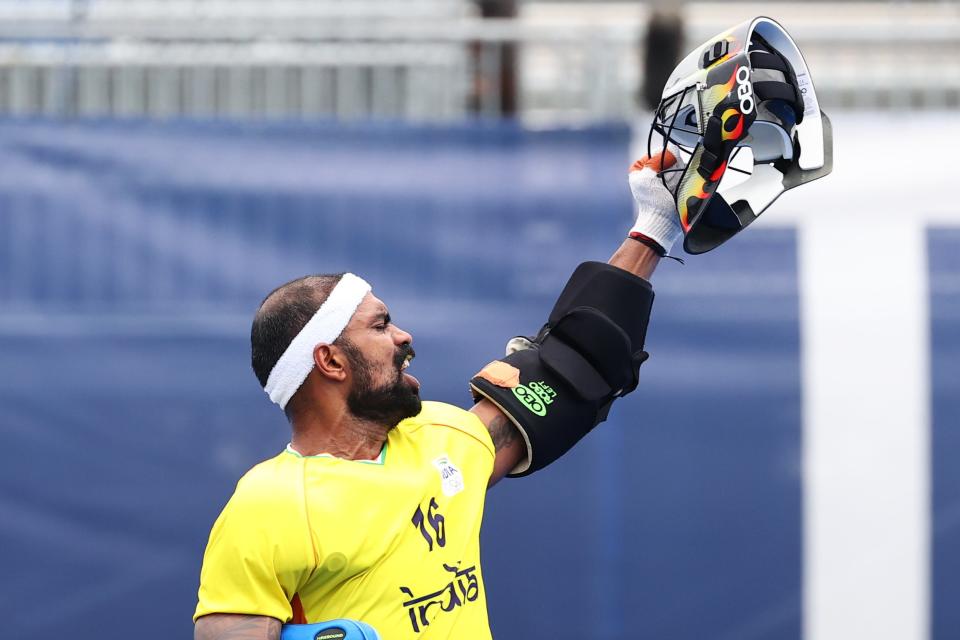Tokyo Olympics: Can the India men’s hockey team end 41 years of hurt?

After heading to Tokyo with such high hopes, India have got off to a rough start in this Olympics and remain with just one medal, the silver won by weightlifter Mirabai Chanu on the first full day of the Games.
If there is any team sport where the promise of an Indian podium finish remains strong, it’s the men’s hockey. The unofficial national sport of India is also its most successful Olympic event, with a record of 11 medals including eight golds.
Yet that illustrious history is in the increasingly distant past. India last won a medal in the men’s hockey in Moscow in 1980. Since then it has been 41 years of hurt, reaching a nadir in 2008 when for the first time in 88 years they failed to even qualify for the Beijing Games.
A comfortable 5-3 victory over Japan on Friday confirmed India’s place in the knockout rounds, which begin from Sunday, and apart from a collapse against Australia they have won four out of their five group stage matches.
“This team has the full potential to stand on the podium. Right from the goalkeeper to strikers, I have full confidence that they will [be in the top three teams],” Harendra Singh, former coach of the Indian hockey team, tells The Independent. “But we have to go match by match.”
It was from the low point of 2008 that the process of healing and rebuilding this Indian team began, says striker Yuvraj Walmiki, who won more than 50 caps for India from 2010 to 2014. India qualified for London 2012, though they lost every game in their group. In Rio they reached the quarterfinals. And in the run-up to the Tokyo Olympics, the country has achieved several significant milestones.
India won the 2017 Asia Cup, claimed the Asian Champions Trophy in 2018 and won the FIH (International Hockey Federation) Series in 2019. And this year in February, under the captaincy of Manpreet Singh, the men’s hockey team climbed up to fourth in the world rankings, their highest since the inception of the FIH rankings in 2003.
“From 2008 to the Tokyo Olympics, the performance graph has only gone up,” says Walmiki. “And all I can say is that even if we reach the semi-finals, we should be proud of it.”

Singh also echoes that sentiment. “We are very close now, it (the podium) is very much in our reach,” he says. “Climbing from number 4 to number 1 is easier. But when they (the fans) were expecting to be world number 1 from number 11 in 2009, I think it was brave of them but not realistic.”
The process, Singh feels, began after the players started focussing on their fitness. “Hockey is a game of speed and strength. If you don’t work on it, you will never win the game,” he says. “The realisation came after the setback of the 2008 Olympics that until we get fitness in place, we will struggle between 10th and 5th position.”
Under coach Graham Reid, the fitness of the players has only improved, says Walmiki. “India is the fittest team in the Olympics,” he claims.
“Earlier, the gym was for bodybuilding but now they do specific training, working on their hamstring, leg and forearm so that they can take a powerful shot. A lot of the training is about stability and strength.
“And you can see, the quality of passing has improved immensely over the years.”
One potential hitch for India at this Games is a lack of experience. The squad is young, and of the 16 players as many as 10 are playing in their first Olympics. Most pundits agree that while youth can have its advantages, some older heads might have avoided the kind of crushing 7-1 defeat India suffered after going behind early on against Australia last weekend. Captain (Manpreet) Singh called the result a “wake-up call”.
“We are travelling with a very young forward line,” says Ashish Ballal, who played more than 270 matches for India including in Barcelona at the 1992 Games. “First time Olympians are in awe of the situation and overawed by just being part of the Olympic team.
“It takes them a while to put their minds and soul [to the task], and that is exactly what you saw [against Australia],” he says.
“If it was an ordinary tournament, they would have taken better chances. Their confidence and risk-taking abilities would be much higher. What I really felt with the forward line is that most of them were not taking any calculated risk, which is very important.”

(Harendra) Singh, however, feels age should not be a determining factor when it comes to squad selection. “While selecting the player, we do not keep in mind whether he is a senior or a junior. The decision must be based on the current form of the players. I think that’s the best way to go about it.”
And Walmiki argues the team should not be judged too harshly on the basis of that one loss. “The way India made a comeback in its next match against Spain, with a 3-0 win – they have my respect,” he says. “It was a dominating win, you know.
“And the best part about the team was that they were able to convert penalty corners [into goals], something we lacked earlier,” he says.
Like every team at this Games, the Covid-19 pandemic has meant a lot of missed matches leading up to Tokyo. But India’s experts feel the team has really made the most of the delay to the Games, spending an unprecedented amount of time together at the elite Sports Authority of India Training Centre in Bengaluru.
Singh says this spell gave Australian head coach Reid the opportunity to get to know the team better, as well as the Indian culture as a whole. “I think Covid and the lockdown has given Graham Reid an opportunity to understand the players, to be with them and understand their mind[set].”
And that time will also have allowed the team space to strategise their approach against key rivals. “It is all about how you mark the opponents. When you mark the players, you have the opportunity to intercept the attacker,” he says. “You cannot be behind in the marking. And that was [always] one of the drawbacks in the Indian team.”

If India is to achieve their dream of a medal in Tokyo, let alone a gold one, it will require stellar performances from several key players. “(Defender) Surender Singh is a really underrated player and does not get enough limelight, but he is a silent jewel,” says Walmiki. “It is difficult for any opponent to score a goal in front of him, because he covers so well.”
“Amit Rohidas is another one of the key players [in defence],” says Walmiki. One of the hardest jobs in hockey is that of the “first rusher”, who charges down the attacker from an opposition’s penalty corner. “He is the best first rusher in the world, and probably the reason why he made it into the team,” Walmiki explains.
And perhaps the most important individual of all for India is the three-time Olympian goalkeeper PR Sreejesh. The 33-year-old was a rock in India’s match against Spain, not conceding a single goal. “It shows a strength of character that he has developed over the years,” says Walmiki. “He came back strong after India’s match against Australia... it takes a lot of mental strength to do that.
India will face Team GB in the quarter-finals on Sunday, after the British side finished third in their group winning only two and drawing one. Bookmakers have India as favourites in the clash – though the shortest odds for gold overall are with Australia.
“If India is to win a medal or reach the semi-finals, Sreejesh is the key player here,” says Ballal. “It requires the forward line to take more risks, and the penalty corners to be spot on.”
India face Team GB on Sunday at 9pm JST (5.30pm IST, or 1pm BST).

 Yahoo News
Yahoo News 